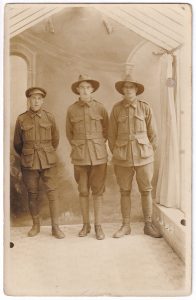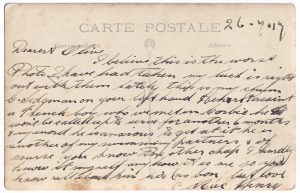[Editor: This postcard, which incorporates a photo of two Australian soldiers and a Frenchman (the latter dressed in an Australian army uniform), is from the era of the First World War (1914-1918). The postcard is dated 26 July 1917.]
Two Australian soldiers and a Frenchman
[Front of postcard]
[A photo of two Australian soldiers and a Frenchman (the latter is dressed in an Australian army uniform).]
[Reverse of postcard]
[Handwritten text, in italics]
26.7.17
Dearest Olive,
I believe this is the worst Photo I have had taken; my luck is right out with them lately.
This is my chum C. Sedgman; on your left hand Henri Persaint, a French boy who we met in Corbie, he won’t be called up to serve for another 6 months & my word he is anxious to get at it, he is another of my swimming partners & of course you know the other chap; I hardly know it myself, anyhow it is me, so you know all about him, he’s (no bon).
Best love,
Mac Henry
[No identifying information about the manufacturer was included on the postcard.]
Source:
Original document
Editor’s notes:
Dimensions (approximate): 90 mm. (width), 139 mm. (height).
The photo shows (left to right) Henri Persaint (a Frenchman), Cyril Ernest Sedgman, and Henry Landale McIntyre.
The writer of this postcard is Henry Landale McIntyre, who has signed himself as “Mac Henry”. He was born in North Carlton (Victoria) on 5 March 1889, and joined the Australian Imperial Force on 23 March 1915 (when he was 26 years old); he was discharged on 31 August 1919 (medically unfit, as the result of military service). He re-enlisted with the Australian military during the Second World War. He died in 1974.
See: 1) “Henry Landale McIntyre”, Discovering Anzacs [the site includes several photos of McIntyre, including (apparently) a copy of the front of this postcard (the copy includes the blemish on the top-right of the photo, situated on the curtains]
2) “McIntyre Henry Landale: SERN 4461” (Australian Imperial Force: Attestation Paper of Persons Enlisted for Service Abroad), Discovering Anzacs
3) “McIntyre Henry Landale: SERN 4461” (Memorandum for: The Inspector-General: The State Savings Bank, Melbourne), Discovering Anzacs [includes discharge details]
4) “Private Henry Landale McIntyre”, Australian War Memorial
5) “McIntyre, Henry Landale”, Virtual War Memorial Australia [gives birth date, 5 March 1889]
6) “McIntyre, Henry Landale”, Virtual War Memorial Australia [WW2 entry; gives a birth date of 5 March 1890, being a year later than his actual birth date, presumably to make himself younger, so that he could sign up for the military]
7) “Search your family history”, Registry of Births, Deaths and Marriages, Victoria
(birth record: name: MCINTYRE, Hy Landale; mother’s name: Barbara; father’s name: MCINTYRE, Archd; place of birth: North Carlton; reg. year: 1889; reg. no.: 10674/1889)
(death record: name: MCINTYRE, Henry Landale; mother’s name: Barbara; father’s name: MCINTYRE, Archibald; place of birth: Carlton North; place of death: Heidelberg [Victoria]; age at death: 86; reg. year 1974; reg. no. 27499/1974)
Cyril Ernest Sedgman was born in Korumburra (Victoria) in December 1896, and joined the Australian Imperial Force on 26 March 1915 (when he was 18 years and 4 months old). He re-enlisted with the Australian military during the Second World War. He died in 1965.
See: 1) “Cyril Ernest Sedgman”, Discovering Anzacs [the site includes two photos of McIntyre, including (apparently) a copy of the front of this postcard (the copy includes the blemish on the top-right of the photo, situated on the curtains]
2) “Sedgman Cyril Ernest: Service Number – 4473 947” (Australian Imperial Force: Attestation Paper of Persons Enlisted for Service Abroad), Discovering Anzacs [gives his birth place as Korumburra, and his age as 18 and 4/12 years]
3) “Sedgman Cyril Ernest: Service Number – 4473 947”, Discovering Anzacs [letter of permission from his parents for him to enlist (Ernest Sedgman and Beryl Mary Sedgman]
4) “Private Cyril Ernest Sedgman”, Australian War Memorial [Service number 947]
5) “Private Cyril Ernest Sedgman”, Australian War Memorial [Service number 4473]
6) “Sedgman, Cyril Ernest”, Virtual War Memorial Australia [Service number 947]
7) “Search your family history”, Registry of Births, Deaths and Marriages, Victoria
(birth record: name: SEDGMAN, Cyril Ernt; mother’s name at birth: HUGHAN, Beryl Mary; father’s name: SEDGMAN, Ernt; place of birth: Kburra; reg. year: 1897; reg. no.: 4400/1897) [the records of the Registry of Births, Deaths and Marriages (Victoria) have Cyril Ernest Sedgman’s birth registration listed as 1897; this may have been due to births in late 1896 not being registered until early 1897]
(death record: name: SEDGMAN, Cyril Ernest; mother’s name at birth: HUGHAN, Beryl Mary; father’s name: SEDGMAN, Ernest Francis; place of birth: Brunswick; place of death: Mont Park; age at death: 69; reg. year 1965; reg. no. 4133/1965)
Corbie = a town in the north of France, in the department of the Somme; it is located west of Amiens and north of Villers-Bretonneux; during the First World War it was used for some time as a rest town for Australian military personnel
See: 1) “Corbie”, Wikipedia
2) “Corbie”, Sir John Monash Centre
no bon = no good; a mixed English-French phrase (used by English-speaking military personnel) from the First World War (1914-1918), incorporating the French word “bon” (meaning “good”)
See: 1) “The English expressions coined in WW1”, BBC News, 22 February 2014
2) “no bon”, Lexico (Oxford Dictionary)
[Editor: For ease of reading, the original text has been separated into paragraphs, and punctuation has been inserted as deemed appropriate.]


Leave a Reply